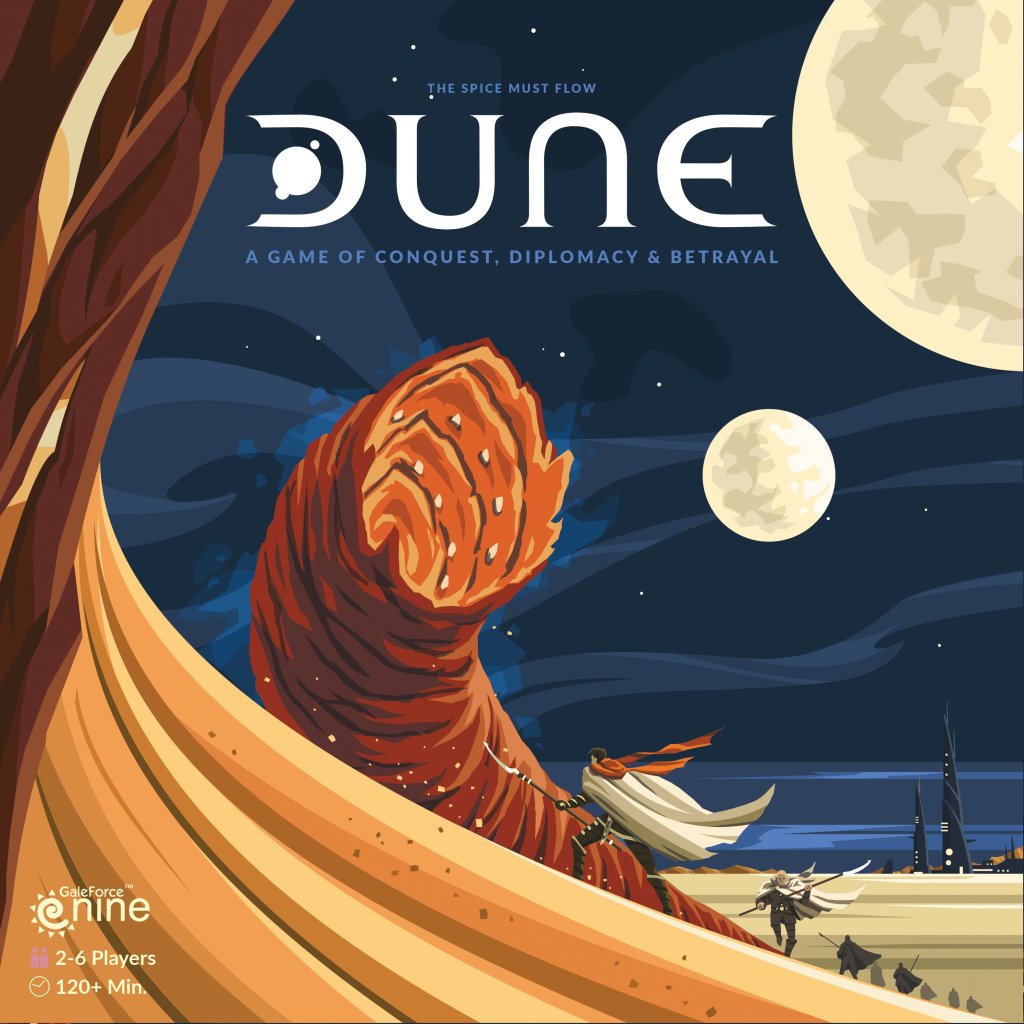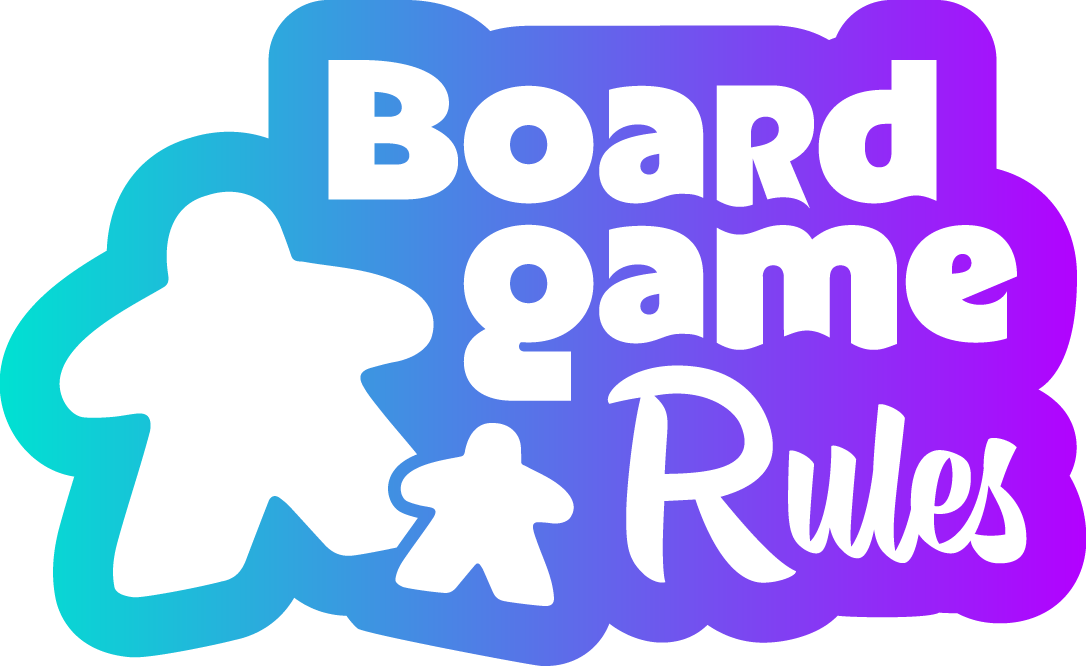Dune
2019
DUNE board game: Lead one of six factions in a thrilling quest for melange, the universe's most valuable resource. Rewrite the script of a renowned Sci-Fi tale!
180
minutes
2 - 6
player(s)
14+
Medium Heavy


About the game
Dune is a captivating board game that immerses players into an epic world of interstellar conflict and political intrigue, based on the iconic science fiction novel by Frank Herbert. Set in the vast, desolate desert landscape of the distant planet Arrakis, also known as Dune, the game offers a rich thematic experience filled with strategy, alliances, and betrayal.
The core mechanics of Dune are designed to create a strategic and tense experience. Players assume the roles of one of the major factions from the Dune universe – like the noble Atreides, the insidious Harkonnen, or the clever Fremen – each with their unique abilities and strategies. Victory is achieved by control of key territories on the map, but the path to success is fraught with challenges as players must manage resources, engage in battles, and negotiate with other players.
Read More
Setup and rules summary
Game components Unboxing the fun!
Dune is an immersive strategy board game based on the classic science fiction novel. The game is rich in components, each of which plays a critical role in the gameplay. Here is a detailed list of the game components and their functions:
1. Game Board: The game board is a map of the planet Dune. It is divided into territories, each of which can be controlled by players. The board is instrumental in planning and executing strategies.
2. Player Shields: Each player receives a shield that represents their chosen faction. The shield is used to hide player’s resources and plans from opponents.
3. Faction Tokens: Each faction has its own set of tokens. These tokens are used to represent the player’s forces on the game board.
4. Spice Tokens: Spice is the currency of Dune. Players collect and spend spice tokens to recruit troops, bid on valuable items, and execute special actions.
5. Treachery Cards: There is a deck of treachery cards that provide players with various advantages, such as special abilities or equipment. These cards are typically obtained through bidding.
6. Battle Wheels: Battle wheels are used to resolve conflicts among players. Players secretly select a number on their battle wheel to indicate how many forces they will commit to a fight.
7. Storm Marker and Storm Track: The storm marker moves along the storm track to simulate the unpredictable sandstorms of Dune. The storm can disrupt player strategies by disabling certain territories.
8. Prediction Markers: Prediction markers are used by the Bene Gesserit faction to predict the game’s outcome. If their prediction is correct, they win the game regardless of the actual situation on the board.
9. Leader Discs: Each faction has a set of leader discs. These leaders add strength to battles and can be the target of treachery cards.
10. Influence Markers: Influence markers are used to track a player’s influence over the three main powers of Dune: the Emperor, the Spacing Guild, and the Fremen.
11. Player Aid Sheets: These are reference sheets for each player, outlining the special abilities of their faction and basic game rules.
12. Kwisatz Haderach Counter: This counter is used by the Bene Gesserit faction to represent the arrival of the Kwisatz Haderach, which can give them a significant advantage.
Game flow Round and round we go
Dune is a strategic board game that takes place on the desert planet of Arrakis, also known as Dune. Players take on the roles of one of the six factions vying for control of the planet. The game is played in rounds, each of which is divided into several phases. Here are the phases that make up each round:
- Storm Phase: The storm marker is moved around the game board, potentially covering certain territories. Any forces in a territory covered by the storm are destroyed.
- Spice Blow and Nexus Phase: Spice counters are placed on territories according to a card drawn from the spice deck. If the ‘Shai-Hulud’ card is drawn, a Nexus occurs, and players may form, break, or maintain alliances.
-
Challange Phase: Beginning with the first player and proceeding clockwise, each player takes a turn. On their turn, a player may take one of the following actions:
- Shipping and Movement: The player may move their forces around the board.
- Spice Collection: The player may collect spice from territories where they have forces and there is uncollected spice.
- Battle: If a player has forces in the same territory as another player, they may initiate a battle.
- Spice Harvest Phase: Players who have forces in the same territory as uncollected spice may collect it.
- Bidding Phase: Players bid on treachery cards, using spice as currency. The player who bids the highest amount of spice wins the card.
- Revival and Movement Phase: Players may revive any forces that were killed in battle or by the storm. They may then move these forces around the board.
- Collection Phase: Players collect income based on the territories they control.
The game continues in this way, round after round, until one player (or alliance of players) controls a certain number of strongholds on the map. That player (or alliance) is then declared the winner.
Players'turn One turn to rule them all
Dune is an intricate board game in which players take on the roles of great Houses vying for control of the desert planet of Arrakis. During each player’s turn, they can carry out a number of potential actions, each affecting gameplay in a unique way. Here is a rundown of the possible actions and strategic choices in a player’s turn.
Bidding phase: This phase involves bidding on treachery cards, which can provide players with special abilities. If you win a card, you can use it in later phases or keep it as a bargaining chip. It’s important to balance your desire for powerful cards with the need to preserve your spice (the game’s currency).
- Revival: At the beginning of a player’s turn, they can revive up to three of their lost forces from the ‘Tleilaxu Tanks’ (where defeated forces go) back into their reserves. This can allow you to bolster your forces and prepare for future battles.
- Collection: A player may then collect spice from any territories they control that contain spice. This can be crucial for funding your activities in later phases of the game.
- Movement: Players can move their forces across the board to different territories. This can help you to seize control of new regions, defend your existing territories, or position yourself to attack other players.
Battle phase: If two or more players’ forces share the same territory, a battle ensues. The outcome of these battles can drastically reshape the state of the game, potentially eliminating players’ forces or changing the control of key territories.
- Battle Plan: Each player involved in the battle secretly devises a battle plan, which involves allocating forces, and potentially playing a leader and/or a treachery card.
- Resolution: The players reveal their battle plans. The player with the higher total (combined strength of forces and leader, and any bonuses from cards) wins the battle. Winning battles can help you to gain control of territories and eliminate rival forces.
- Attrition: The loser’s forces are sent to the Tleilaxu Tanks, and the winner loses as many forces as they committed to the battle, keeping control of the territory.
Spice blow phase: At the end of each round, a spice blow occurs. This can deposit valuable spice in a random territory, potentially providing a new objective for players to fight over in the next round.
In conclusion, during a player’s turn in Dune, strategic choices about resource management, positioning, and combat can all have significant impacts on the shape of the game. Mastering these elements is key to achieving victory on the sands of Arrakis.
End of the game All good games must come to an end
The game of Dune concludes when a player or coalition achieves victory by controlling a required number of strongholds. As soon as this happens, the game ends immediately. There is no need for final scoring as the game is entirely objective-based, not point-based. Therefore, the winner is determined by control of specific areas, not accumulated points.
The victory conditions for Dune are as follows:
- Single Player Victory: At the end of a round, if a single player controls at least three strongholds, they are declared the winner.
- Coalition Victory: At the end of a round, if a coalition of players controls at least four strongholds, they collectively win. A coalition is formed when two players agree to join forces. Coalition partners share the victory or defeat as a team.
Before a player or coalition can claim victory, all players must finish their turns for the current round to ensure everyone has had an equal number of turns. This is to maintain fairness, as some strategies might be slower to execute than others. However, if a player or coalition meets the victory conditions in the middle of a round, they must maintain control of the strongholds until the end of the round to secure the win.
In Dune, it’s crucial to know that controlling a stronghold means you must have at least one troop present and no opposing troops. If both conditions are met, then the stronghold is under your control. Strongholds can change hands many times during the game, leading to dynamic and exciting gameplay.
Also, note that there is no tie-breaker in Dune. If two or more players or coalitions meet the victory conditions at the same time, the game ends in a draw. This reflects the harsh and unpredictable nature of the planet Dune, where victory is never guaranteed.
Scoring Did you outsmart your rivals?
Dune is a strategy board game where players gain control over the desert planet Arrakis. The goal is to control key areas on the map, and the scoring system revolves around this strategic control. Here is the detailed scoring system:
Control of Territories
In Dune, players earn points by controlling territories. Each territory controlled at the end of a game round provides a specific number of points:
- Each stronghold controlled: 1 point
- Controlling Carthag or Arrakeen: 2 points
- Controlling the Imperial Basin: 1 point
- Controlling the Polar Sink: 1 point
Spice Collection
Spice is a valuable resource in the game of Dune. Players can gain points through spice collection:
- Each spice collected: 1 point
Battles Won
The game of Dune involves strategic battles, and players can earn points by winning these encounters:
- Each battle won: 1 point
Tie-Breaking Rules
In the event of a tie at the end of the game, the following rules are applied in order:
- The player who controls the most territories wins the game.
- If there is still a tie, the player with the most spice wins.
- If there is still a tie, the player who won the most battles wins.
- If there is still a tie, the player with the highest total of troops and leaders wins.
Note that these points are not cumulative; each step in the tie-breaking process is mutually exclusive and only used if the previous steps have not determined a winner.
Particular Cases and Exceptions Wait… is that legal?
The board game ‘Dune’ is based on Frank Herbert’s science fiction series of the same name. While the game is beloved for its strategic depth and thematic richness, it also has a number of special rules and exceptions that can make it difficult for new players to learn. Here are some of the most important ones:
Treachery Cards:
Treachery Cards are powerful items that can turn the tide of a battle or alter the game in unexpected ways. However, they also have specific rules:
- Each player can only hold a maximum of four Treachery Cards in his/her hand.
- Treachery Cards can only be used once and then must be discarded.
- Players cannot trade or give away Treachery Cards.
Storms:
Storms are a unique mechanic in ‘Dune’. They move around the map and destroy any forces they touch. Here are some important clarifications about storms:
- The storm starts the game in a random location and moves clockwise around the board.
- Forces inside a stronghold or the polar sink are safe from storms.
- If a storm passes over a spice blow, the spice is removed from the game.
Winning the Game:
The primary way to win ‘Dune’ is to control three strongholds at the end of a turn. However, there are some exceptions:
- The Bene Gesserit faction can predict at the start of the game which faction will win and in which round. If their prediction is correct, they win instead.
- The Fremen faction wins automatically if no one else has won by the end of the last round.
Special Faction Abilities:
Each faction in ‘Dune’ has special abilities that bend or break the standard rules. Some important ones include:
- The Atreides can look at the top card of the spice deck.
- The Harkonnen can hold more treachery cards than other factions.
- The Emperor receives all the money spent on treachery cards.
- The Spacing Guild can move other players’ forces around the map.
- The Fremen can survive in the storm and move through sand terrain without penalty.
- The Bene Gesserit can coexist with other factions in the same territory.
Tips and tricks Play smarter, not harder!
Dune is a highly strategic and competitive board game based on the sci-fi novel by Frank Herbert. Here are some advanced strategies, beginner tips, and common mistakes to avoid in order to optimize your gameplay.
Advanced Strategies:
- Understanding the game’s factions: Each faction in Dune has unique abilities and strengths. Understanding these can help you tailor your tactics to your chosen faction and counter those of your opponents.
- Control the Spice: The spice is the game’s main economy. Controlling areas where the spice is rich can give you a significant advantage, allowing you to bid for powerful cards or recruit more forces.
- Manipulate the storm: The storm is a key element of Dune’s gameplay. Try to predict its movements and use it to your advantage, such as trapping enemies or protecting your own territories.
Beginner Tips:
- Start with a simple faction: If you’re new to Dune, starting with a simpler faction like the Atreides or Harkonnen can help you learn the game’s mechanics before moving on to more complex ones.
- Focus on alliances: Forming alliances with other players can be beneficial, especially if your abilities complement each other. However, be aware that alliances can be broken and betrayals are part of the game.
- Manage your resources wisely: Don’t spend all your spice at once. Save it for critical moments when you need to bid on powerful cards or recruit more forces.
Common Mistakes to Avoid:
- Ignoring the storm: The storm can wipe out your forces if you’re not careful. Always keep track of its movements and plan your strategies accordingly.
- Overextending your forces: While it’s important to control as many territories as possible, spreading your forces too thin can leave you vulnerable to attacks.
- Forgetting about treachery cards: Treachery cards can turn the tide of a battle. Always be aware of what cards your opponents might have and plan your strategies accordingly.
Ways to Optimize Gameplay:
- Plan your moves in advance: Dune is a game of strategy. Always try to think a few steps ahead and anticipate the moves of your opponents.
- Adapt to the changing game state: The game state in Dune can change rapidly. Be ready to adapt your strategy if things don’t go as planned.
- Always have a backup plan: Even the best-laid plans can go awry in Dune. Always have a backup plan in case things don’t go your way.
